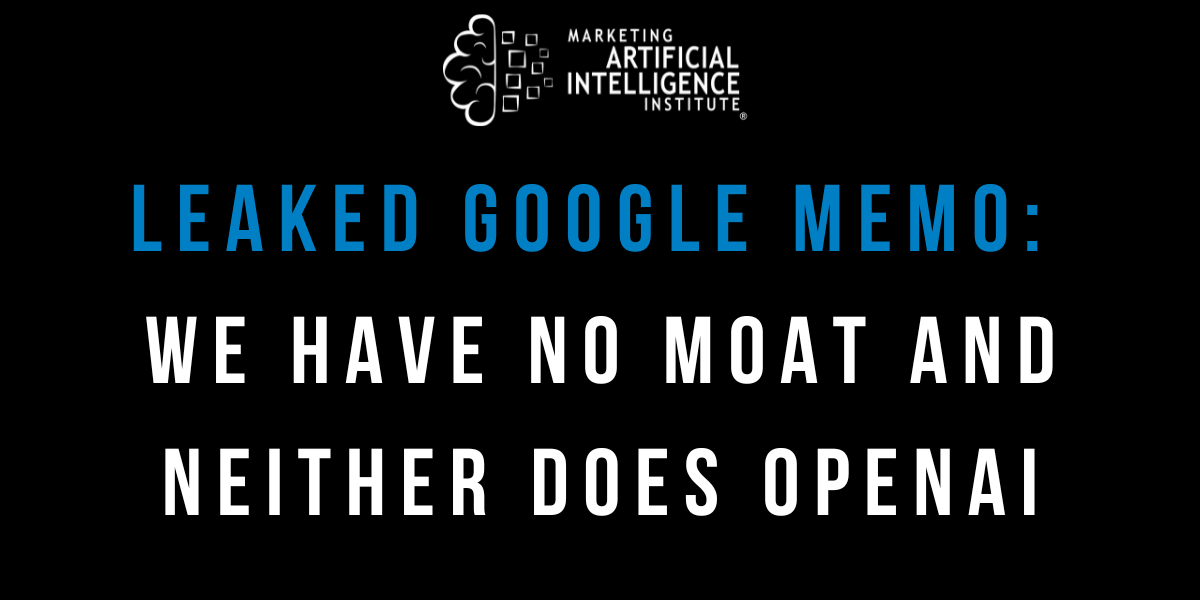“We have no moat, and neither does OpenAI.”
Those words come from a leaked Google memo that reveals that at least one senior software engineer is concerned the company will lose the AI competition to open source technology.
The memo states that while Google and OpenAI have been focused on each other, open source projects have been solving major AI problems faster and more efficiently.
The memo’s author, an unidentified senior software engineer, says that Google's large AI models are no longer seen as an advantage, with open source models being faster, more customizable, and more private.
The memo suggests that Google should consider joining the open source movement and owning the platform, similar to how they dominate with Chrome and Android.
This memo comes amidst reports of rapid shifts within Google itself, as the company pivots to compete with AI developments from OpenAI, Microsoft, and others.
One such shift happened in December, when Google declared a “code red” to refocus on AI. Another happened in February when Google’s head of AI, Jeff Dean, made a major policy shift.
In the past, AI researchers at Google were encouraged to share their research by publishing academic papers. (Google’s groundbreaking work on transformers in 2017 was one such paper.) Now, Google will focus on turning AI breakthroughs into products before sharing research papers.
On Episode 46 of the Marketing AI Show, Marketing AI Institute founder/CEO Paul Roetzer broke down the memo's significance.
- This is a single point of view. It’s important to remember that this memo comes from a single senior software engineer. Just because the memo is out there doesn’t mean decision-makers at Google put a lot of weight behind it or agree with its arguments, says Roetzer.
- But it raises a very important point to consider: open source. The memo writer emphasizes that Google needs to take competition from open source models and products seriously. And, indeed, open source has become a major concern for big AI companies thanks to a recent development in the space.
- Because open source is now having its “LLaMA moment.” Recently, Meta announced it had built LLaMA, a 65-billion parameter foundational large language model. Meta intended to do a controlled release of the model to the research community. Instead, the model was leaked publicly. That means anyone can build on top of LLaMA and use it for their own purposes. “That started changing things,” says Roetzer. In fact, we’ve already seen an explosion of open source innovation on top of LLaMA.
- This may disrupt Google’s previous strategies. The memo writer points out that the leak of LLaMA could make Google’s own models—and the products built on top of them—less competitive. Why would someone pay for Google’s models and products when they can access an expensive, powerful model like LLaMA, and the products built on top of it, for free?
- Embracing open source could be one path forward. The core argument of the memo writer is this, says Roetzer: “Google has to find another way that this path of building these massive language models that are closed to everybody is not going to win.” That could include owning and supporting the open source ecosystem.
The bottom line: Whether or not Google takes the memo seriously, the document provides useful insights into the AI competitive landscape and the importance of open source.
Don’t get left behind…
You can get ahead of AI-driven disruption—and fast—with our Piloting AI for Marketers course series, a series of 17 on-demand courses designed as a step-by-step learning journey for marketers and business leaders to increase productivity and performance with artificial intelligence.
The course series contains 7+ hours of learning, dozens of AI use cases and vendors, a collection of templates, course quizzes, a final exam, and a Professional Certificate upon completion.
After taking Piloting AI for Marketers, you’ll:
- Understand how to advance your career and transform your business with AI.
- Have 100+ use cases for AI in marketing—and learn how to identify and prioritize your own use cases.
- Discover 70+ AI vendors across different marketing categories that you can begin piloting today.
Mike Kaput
Mike Kaput is the Chief Content Officer at SmarterX and a leading voice on the application of AI in business. He is the co-author of Marketing Artificial Intelligence and co-host of The Artificial Intelligence Show podcast.



